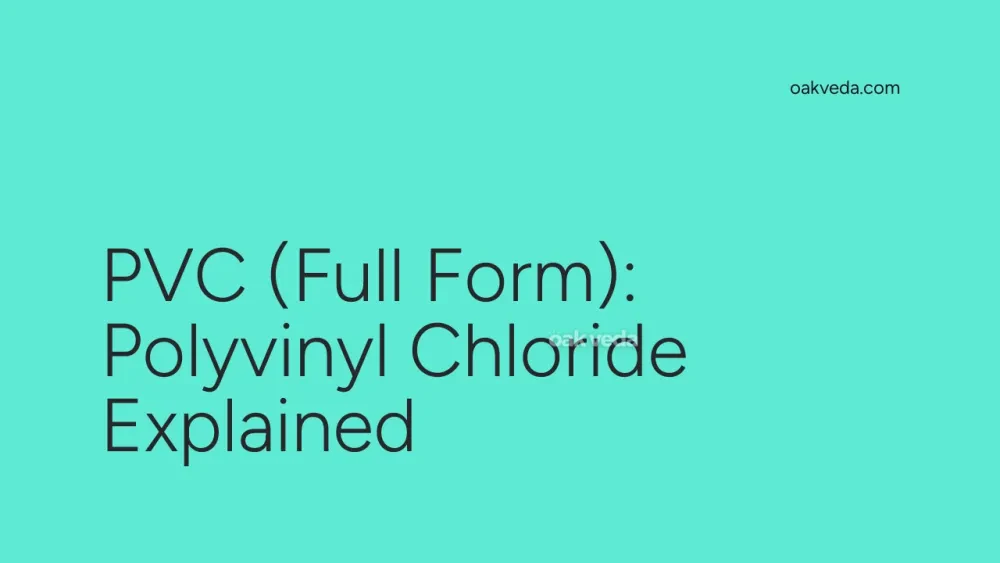
What is the Full Form of PVC?
PVC is an abbreviation that primarily stands for Polyvinyl Chloride. This versatile synthetic plastic polymer has become an integral part of our daily lives, finding applications in numerous industries and products. Understanding the full form of PVC is crucial for anyone interested in materials science, manufacturing, or environmental studies.
What is Polyvinyl Chloride?
Polyvinyl Chloride, commonly known as PVC, is a synthetic plastic polymer created through the polymerization of vinyl chloride monomers. It's a thermoplastic material, which means it can be melted and reshaped multiple times without significant degradation of its properties. PVC's chemical formula is -[CH2=CHCl]n-, where 'n' represents the number of repeating units in the polymer chain.
Origin and Development of Polyvinyl Chloride
The history of PVC dates back to the early 19th century when it was accidentally discovered by French physicist Henri Victor Regnault in 1838. However, it wasn't until the 1920s that commercial production of PVC began. The development of plasticizers in the 1930s significantly expanded PVC's applications, making it more flexible and versatile.
How does Polyvinyl Chloride work?
PVC's unique properties stem from its molecular structure. The chlorine atoms in the polymer chain contribute to its fire-resistant properties and chemical stability. The manufacturing process of PVC involves several steps:
- Ethylene production from crude oil or natural gas
- Chlorination of ethylene to produce ethylene dichloride (EDC)
- Cracking of EDC to create vinyl chloride monomer (VCM)
- Polymerization of VCM to form PVC
The most common polymerization methods for PVC production are:
- Suspension polymerization
- Emulsion polymerization
- Bulk polymerization
Types of Polyvinyl Chloride
PVC can be categorized into two main types:
- Rigid PVC: Used in construction materials, pipes, and window frames
- Flexible PVC: Used in cables, flooring, and inflatable products
The flexibility of PVC can be adjusted by adding plasticizers, allowing manufacturers to create products with varying degrees of rigidity or softness.
Functions of Polyvinyl Chloride
PVC serves numerous functions across various industries:
- Construction: Provides durable and low-maintenance building materials
- Plumbing: Offers corrosion-resistant and long-lasting pipes
- Electrical: Acts as an excellent insulator for wires and cables
- Healthcare: Used in medical devices and blood storage bags
- Automotive: Contributes to lightweight and durable car parts
Applications of Polyvinyl Chloride
The versatility of PVC has led to its widespread use in numerous applications:
- Construction materials (pipes, windows, doors)
- Electrical cable insulation
- Flooring and wall coverings
- Credit and debit cards
- Packaging materials
- Raincoats and other waterproof clothing
- Inflatable products
- Signage and banners
- Phonograph records (vinyl records)
- Artificial leather
Features of Polyvinyl Chloride
PVC boasts several unique features that contribute to its popularity:
- Durability: Resistant to weathering, chemicals, and corrosion
- Versatility: Can be rigid or flexible depending on the formulation
- Fire resistance: Self-extinguishing due to high chlorine content
- Low cost: Economical compared to many other materials
- Recyclability: Can be recycled multiple times
- Lightweight: Reduces transportation and installation costs
Benefits of Polyvinyl Chloride
The use of PVC offers numerous benefits across various sectors:
- Cost-effectiveness: PVC is generally less expensive than alternative materials
- Longevity: PVC products have a long lifespan, reducing replacement frequency
- Energy efficiency: PVC insulation helps reduce energy consumption in buildings
- Water conservation: PVC pipes minimize water loss in distribution systems
- Safety: Fire-resistant properties enhance safety in construction and electrical applications
Limitations or Challenges of Polyvinyl Chloride
Despite its many advantages, PVC faces some challenges:
- Environmental concerns: Production and disposal can release harmful chemicals
- Health risks: Some additives used in PVC, like phthalates, may pose health risks
- Recycling complexities: Different PVC formulations can complicate recycling processes
- UV sensitivity: Unprotected PVC can degrade when exposed to sunlight
- Limited high-temperature applications: PVC's relatively low melting point restricts its use in high-heat environments
Future Developments in Polyvinyl Chloride Technology
The PVC industry is continuously evolving to address challenges and improve performance:
- Development of bio-based plasticizers to replace phthalates
- Improved recycling technologies for PVC products
- Research into more environmentally friendly production methods
- Exploration of PVC nanocomposites for enhanced properties
- Integration of PVC with smart technologies for advanced applications
FAQs on PVC Full Form
-
What is another full form of PVC? PVC can also stand for Permanent Virtual Circuit in the context of telecommunications.
-
Is PVC environmentally friendly? While PVC has some environmental challenges, ongoing research and development are focused on improving its sustainability and recyclability.
-
Can PVC be recycled? Yes, PVC can be recycled multiple times, although the process can be complex due to various formulations.
-
Is PVC safe for use in food packaging? PVC is used in food packaging, but regulations vary by country. Some concerns exist regarding potential chemical leaching.
-
How long does PVC last? PVC products can last anywhere from 30 to 100 years, depending on the application and environmental conditions.
Understanding the full form of PVC – Polyvinyl Chloride – is essential for grasping its significance in modern industry and daily life. As technology advances, PVC continues to evolve, addressing challenges and expanding its applications across various sectors.
You may be interested in:
- WMO (World Meteorological Organization)
- RTI (Right to Information): Full Form and Importance
- GDP (Gross Domestic Product): Full Form and Meaning
- UNO (United Nations Organization) Full Form
- NASDAQ (Full Form): National Association of Securities Dealers Automated Quotations
- UNIDO (United Nations Industrial Development Organization)

